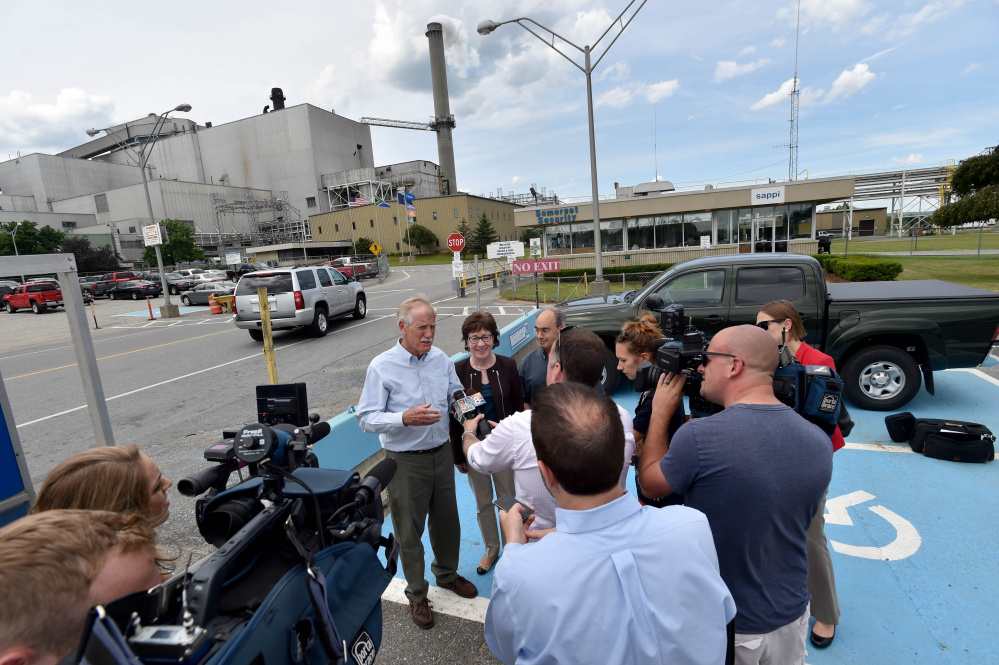SKOWHEGAN — Members of Maine’s congressional delegation said Friday that they are optimistic about the future of the state’s forest products industry while touring the Sappi Fine Paper mill a day after announcing the formation of a federal economic development team that will work with Maine businesses in the wake of several mill closures.
“We had a great visit today at Sappi,” said Sen. Angus King, I-Maine. “The demise of the paper industry in Maine has been grossly exaggerated. That’s one of the points we want to get across. This is a great mill, the seventh-largest coated paper mill in the world and they’re working hard and making progress.”
King, who also visited the Androscoggin Mill in Jay on Friday, joined Sen. Susan Collins, R-Maine, and Rep. Bruce Poliquin, R-2nd District, at the Skowhegan mill, where they met with workers and officials and toured the plant. Earlier in the week the three, along with Rep. Chellie Pingree, D-1st District, received notice from the U.S. Department of Commerce that the federal government will put together an Economic Development Assessment Team, at the request of Collins and King, to evaluate the future of Maine’s forest products industry and how it can remain viable.
The request in March came on the heels of Madison Paper Industries closing — the fifth mill to close in the state in two years.
Key to the success of Maine’s remaining mills is innovation, members of the delegation said Friday.
“There are still about 35,000 jobs in the woods products industry here in Maine — sawmills, loggers, truckers, paper mills. We need to do everything humanly possible to help these mills thrive,” Poliquin said.
Skowhegan’s Sappi Fine Paper employs about 800 people and produces more than 2,000 tons of coated paper per day.
“Sappi North America was pleased to host a tour of our Congressional delegation in Maine today and we appreciate the support they provide the pulp and paper industry,” said Mark Hittie, director of packaging brands and communications for Sappi North America in a prepared statement. No one from Sappi was at a news conference with the media and members of the delegation at the facility Friday.
On Friday’s tour, which was closed to the media, Collins said the delegation learned that while coated paper, a glossy paper often used in magazine printing, is still an important product, the Skowhegan mill also is looking at other paper products they can make.
“For example, they’re looking at packaging for food, for dog food. That’s really important, that these mills diversify in order to keep jobs,” she said.
Sappi North America has been producing LusterPrint, a grease-resistant paper used primarily for pet food packaging, since 1993, and last year it expanded the line to include a new paper called LusterCote at the Skowhegan mill, according to Hittie.
The launch of the new paper line was a key facet in the company’s decision to expand production of packaging materials, according to a news release issued in February 2015.
The EDAT team announced Thursday will be modeled on the National Disaster Framework and will be similar to groups the federal Economic Development Administration has used to address more than 30 other major incidents and economic development crises, such as the New England fisheries challenges, the Deepwater Horizon oil spill and Colorado wildfires and flooding.
Agencies that will be involved include the Department of Agriculture, the Department of Labor, the Department of Energy, the Environmental Protection Agency, the Department of the Treasury, the Small Business Administration, and the Northern Border Regional Commission. Representatives from those groups will meet with local community and business representatives beginning this month to discuss strategies for economic growth and recovery, the delegation said.
They also will look at other factors, such as high energy costs, foreign competition and the high value of the U.S. dollar in terms of how they affect the health of the forest products economy.
“It’s going to be a comprehensive look at the industry,” Collins said. “It will cut across agency lines and will have great involvement from stakeholders here in Maine. That’s the most important part. What I hear that we need is an inventory of the wood resources that we have in our state.”
The Maine Forest Products Council and University of Maine and state officials also are looking at questions of economic development around the forest products industry, according to an emailed statement Friday from Patrick Strauch, executive director of the Maine Forest Products Council.
“We welcome a discussion with federal officials about resources that might contribute to our effort to strengthen our businesses and the rural communities that rely on the 33,538 jobs our industry support in Maine,” Strauch said.
The federal team plans to produce a customized economic development plan for each community it looks at as a guide to creating new jobs and future economic development. Members of the team initially will come to Maine for three days this month, though exact dates have not yet been set, according to a news release Thursday from the delegation.
“This is only the 30th time the federal government has done anything like this across the country,” King said. “It’s really a big deal to focus the resources of the federal government on helping. It’s a bottom-up process that will start with the people on the ground and the problems they have.”
Rachel Ohm — 612-2368
Twitter: @rachel_ohm
Copy the Story LinkSend questions/comments to the editors.





Success. Please wait for the page to reload. If the page does not reload within 5 seconds, please refresh the page.
Enter your email and password to access comments.
Hi, to comment on stories you must . This profile is in addition to your subscription and website login.
Already have a commenting profile? .
Invalid username/password.
Please check your email to confirm and complete your registration.
Only subscribers are eligible to post comments. Please subscribe or login first for digital access. Here’s why.
Use the form below to reset your password. When you've submitted your account email, we will send an email with a reset code.